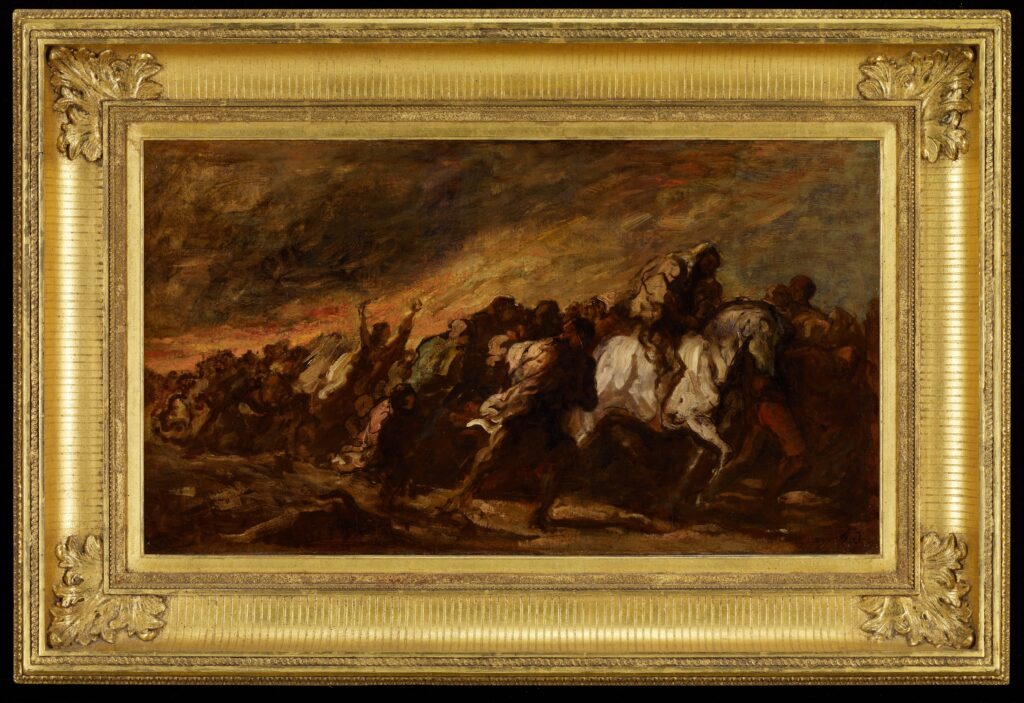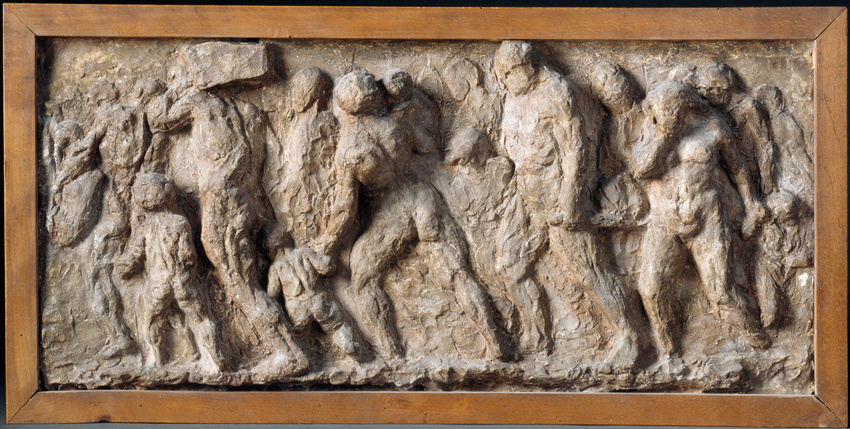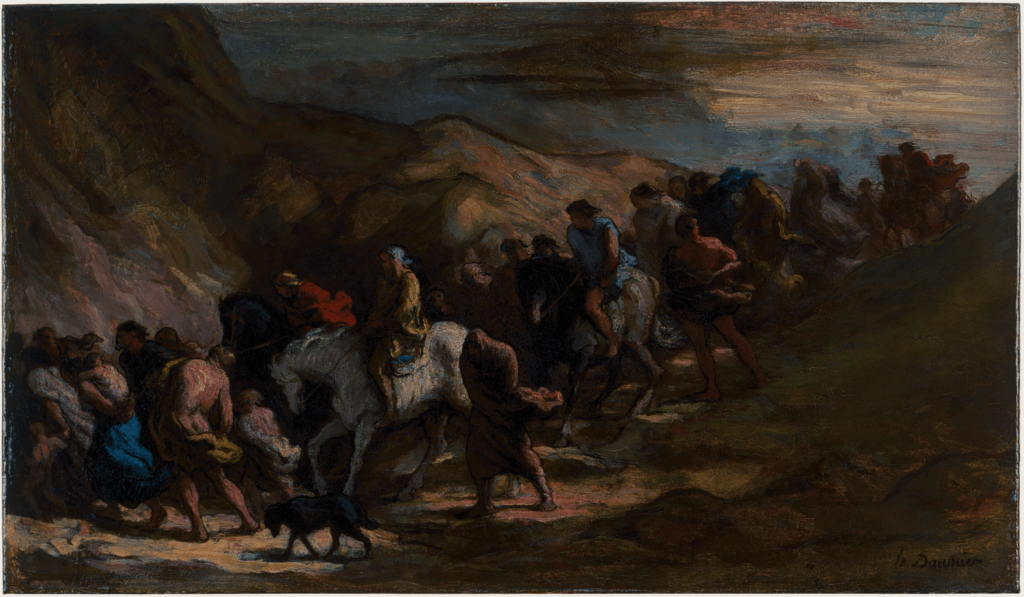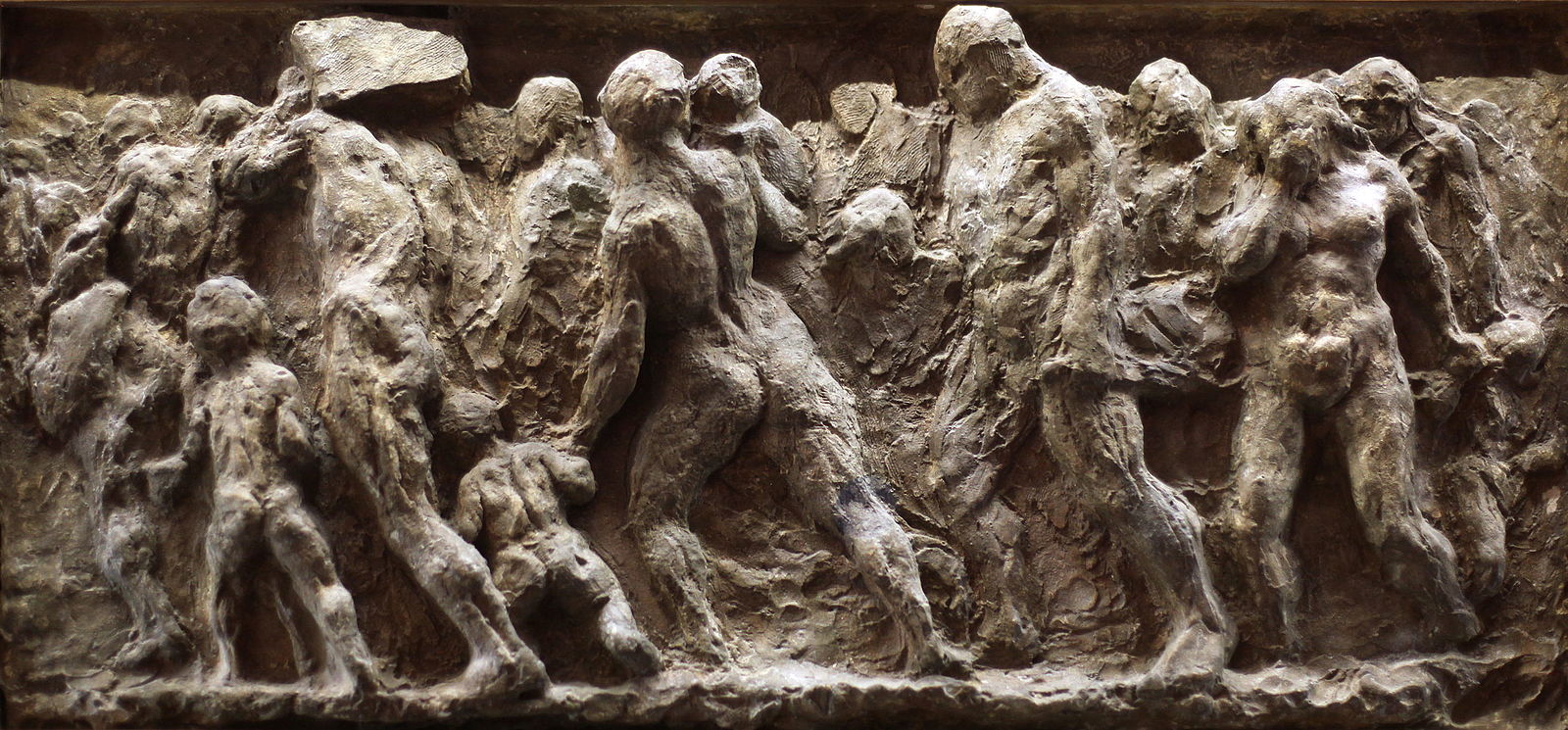Legislating migration
Sick and hungry people came in droves, roaming the streets either as strangers or imposters. The cities began to fear the loss of public order and social peace and searched in vain for a scapegoat that would relieve this sense of confusion. Maybe world trade was to blame, maybe failed harvests or corruption or, perhaps, those who had fled from poverty had brought all this misery upon themselves. Whatever or whomever was to blame, decisions had to be taken and the fraudsters weeded out from those truly in need. A new law was proposed according to which people were to receive aid at their birthplaces. Those with official documents proving that they were entitled to support were to be cared for in special centres created for that purpose. This type of approach was already being practiced successfully in other countries coping with the same problems. However, the new law, welcomed by many cities, also provoked criticism. Not least the Church voiced concerns. Was this still in line with the principles of Christianity?
This picture describes nothing less than a poverty crisis, the attempt to overcome it through legislation, and the debates regarding who is worthy of support and who obliged to provide it. We could well be referring to the present day. But these issues, discussions and proposed measures date back to the 1540s in what is now Spain. We know of these problems because leading theologians of the time voiced their views on the matter. One treatise arguing against the law, In causa pauperum deliberatio, received particularly great attention. Its author was the Dominican, Domingo de Soto, who published the text in both Latin and Spanish in 1545, the same year that he was sent to the Council of Trent to act as an advisor to Emperor Charles V. Domingo de Soto is seen as one of the central figures of the so-called School of Salamanca. This school of theologians, associated above all with Francisco de Vitoria, considered to be its founding father, has by now gained a firm place in the history of theology, philosophy, economics and the natural sciences. It also played an important role in legal history: over the decades of early modern state formation (actively shaped by the Reformations, European overseas expansion and the media revolution), its members made fundamental contributions to contemporary thought on punishment and guilt, contracts and restitution, the legitimacy both of rule and of resistance. Indeed, the juridical-political language of their works influenced international law up to the present day.
World community of reciprocal rights and duties
Domingo de Soto’s arguments regarding the right way to deal with the poor is in many ways typical of the thinking of the School. It is of a rationale that has become alien to us, but nevertheless remains impressive due, above all, to its depth and coherence. De Soto’s reasoning also directs us towards a historical context that may be particularly thought-provoking given the current discussions on migration, the right of asylum, and free world trade. From the same reasoning he and others used to legitimize the free movement of goods and missionaries, de Soto derived the right of people in need to be provided with everything they required for their self-preservation as well as the duty of all people to provide the poor with basic means for subsistence. Such reasoning sprang from an age of European expansion, when theologians and philosophers believed that there existed a world community beyond all political units – all, cities, all states – that was linked by rights and duties shared by all. This normativity of the world community was called the ius gentium. Their reflections were based on the ancient tradition, on Roman and canon law, and on the theology and philosophy of the Middle Ages. From this ius gentium (which in subsequent centuries developed into the much more narrowly defined international law), they derived the rights to freedom of movement, to engage in trade or mission, but also the duties to tolerate others engaging in these activities and to provide everyone with everything necessary for self-preservation, irrespective of where they were from. Thus, the free movement of goods and people – the opportunity for commercial profit therewith – and the duty to ensure a livelihood for everyone, were two sides of the same coin.

Legitimisation of European expansion
Such a cosmopolitan perspective led Domingo de Soto to utopian demands for social policies: an obligation to provide aid to those in need, a right to a guaranteed subsistence minimum, and the duty of all political communities to tolerate peaceful migration, whether those migrants be Christians or not. But the argument on the basis of the ius gentium was ambivalent: it also served to legitimise European expansion. As shown by Domingo de Soto and, particularly effectively, by Francisco de Vitoria in his famous lectures on the New World in 1539, the Spanish presence in the Americas could not be justified by papal donation, as the Catholic kings had claimed, nor by the supposed inability of the indigenous ‘barbarians’ to hold property or to form a system of government, as some jurists had argued. While for the Protestant Europe, growing and consolidating precisely in this period, papal bulls and decrees were nothing more than worthless pieces of paper, the contemporary encounter with the great Aztec and Inca civilizations made clear that those prejudged ‘barbarians’ had the same intellectual capacity as the foreigners arrived from overseas and were absolutely able to rule themselves according to coherent political and social criteria. Taking into account all these factors and constantly updating their reasonings according to the unforeseen news arriving every month from the European and American frontiers, the theologians from Salamanca pointed to the ius communicationis – the right to move, to trade and to evangelise freely and peacefully throughout the whole world, all derived from the ius gentium – that legitimised the Spanish presence in America. Anybody who sought to curtail this right could face a just war, a bellum iustum.
Some modern interpreters see this argumentation as proof that the thinkers of the School of Salamanca were courageous critics of the Spanish crown; others read it as the work of cynical apologists of power, granting their sovereigns a kind of sophisticated and pious alibi. Francisco de Vitoria has been hailed the “father of international law”, but his thinking and, above all, the use made of it by the architects of Eurocentric, colonialist international law at the end of the 19th and the beginning of the 20th centuries, has also been severely criticised, not least by the representatives of so-called Third World Approaches to International Law (TWAIL). Vitoria’s and de Soto’s contributions to the poverty debate are also ambivalent, particularly regarding the question of who is to be considered as truly in need. However, such interpretations often overlook the fact that the two thinkers used their argumentation not just to legitimise Spanish overseas expansion, but also to apply it to problems which led them, for example, to postulate a general duty to alleviate the famine in contemporary Salamanca. Thus, in several cases, thinkers of the School arrived at views different to those of the Crown. Had their unambiguous judgments been followed, in these as in other cases, they would have had enormous economic consequences for those in power.
European expansion of right, but not duty
In the 500 years since Vitoria and de Soto articulated their argumentation based on the ius communicationis, the ius gentium was developed in Europe to expand the right to trade and the legitimate exercise of power. With the help of ‘semi-peripheral jurists’, Grotius, Locke, Vattel, Schmitt, to name only a few, forged out of the ius gentium an inter-state law that primarily served European imperial interests. It also protected the informal European empires such as the multinationals of the early modern period like the Dutch East India Company. Crucially, the ius gentium was also developed in imperial practices, as recent legal historical studies have emphasised. The result was the transfer of an unimaginable amount of resources from the colonies to the European metropole. It is estimated that in the course of this early modern globalisation, about 12.5 million people from Africa were traded as slaves, that is, as goods. They, too, contributed to the profits that made Europe and North America what they are today. In recent years, awareness of these connections has been rising, leading to the toppling of quite a number of monuments.

And the other side of the coin? A similarly extensive legal elaboration of the right to migrate, the right to be provided with what is necessary for self-preservation in any location, or of a general legal obligation to enable opportunities for livelihood — all also postulated by Domingo de Soto — has not taken place. This is also astonishing not least because other philosophers and jurists were arguing for similar obligations, such as Hugo Grotius in his De Iure Belli ac Pacis Libri Tres, who here, as in many other instances, follows Francisco de Vitoria’s earlier reasoning. Whereas Grotius supported his claim for a duty to take in refugees mainly with references to antique authorities and offered little in the way of additional philosophical arguments, Samuel Pufendorf provided the latter in his De iure naturae et gentium of 1672, a work which was subsequently translated into many languages. In this text, Pufendorf not only wrote that human beings should not act like dogs, barking at strangers, he also stated certain general obligations of humanity, officia humanitatis, to which corresponded certain (albeit not enforceable) rights – some of which go so far that even in the event of a famine in one’s own country, one is not permitted to expel those whose lives are threatened should they return home.
Legal history’s insights
Of course, the fact that for some Aristotelian-Thomist thinkers of 16th-century Salamanca or Protestant natural rights theorists in 17th century Germany, the free movement of goods and people, basic rights to migration and trade, the opportunity for profit and the duty to secure the livelihood of the poor belonged inseparably together does not create obligations for us today. What does, however, is our actions in the past –the undeniable fact that European prosperity and African poverty are historically inseparable. Invaluable to this recognition are the texts from Salamanca, or the considerations of a Grotius or a Pufendorf, which draw our attention to the original connections between the philosophical and legal legitimation of the free movement of goods and of people, and to the simultaneity of rights of mobility and trade with the duty to care for the needy and to provide opportunities of livelihood. Both rest on the same cosmopolitan reasoning.

Looking at legal history since the 17th century, however, the effectiveness of the regimes developed in European law to protect these different rights vary greatly: there is strong protection for trade and only weak protection for migration. The current simultaneous ‘crises’ of migration and of world trade also demonstrate that, without a cosmopolitan perspective such as that of the non-state-bound ius gentium, we quickly come up against the limits of our national, supranational, and international law, which are all closed to norms thought to exist outside their borders and ultimately always take the state as their frame of reference. Would it not be time to recognise that globalisation, which has made Europeans make a great deal of money for centuries, is not only associated with rights but also with minimum obligations of equal binding force?
It was not by accident that after World War II, Europe constituted itself as a ‘community of law’ and founded its identity above all on a shared legal culture that had developed over the course of centuries. Among the key achievements of this legal culture is the idea that law does not only serve to protect power, that it does not take as its yardsticks only individual self-interest and economic considerations, but instead assumes a minimum of reciprocity and coherence. To insist on these is perhaps the core of our understanding of law and the very particular task of legal scholars. At the university of Salamanca, which celebrated the 800th anniversary of its foundation in 2018, and among the scholars of this epoch-making School, there was never any doubt that law could only be just if it was coherent and consistent. We would do well to remind ourselves of this.
This text is based on an article published in German in the Frankfurter Allgemeine Zeitung of 31 July 2018, page 11.
Cite as: Duve, Thomas: Migration and trade: two sides of the same coin?, legalhistoryinsights.com, 23.02.2024, https://doi.org/10.17176/20240229-112733-0



 This work is licensed under a
This work is licensed under a 